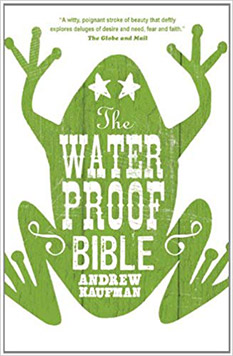
I bought a copy of The Waterproof Bible this summer in a Haliburton book store called Master’s Book Store. Naive person that I am, it never crossed my mind that the Master refers to Jesus and the book store is a Christian book store. I stepped inside and found myself inundated by thousands of unfamiliar titles. Normally, when I step into a book store, I find it easy to orient myself. I carry with me a mental map and have a good idea what to expect in any given section. Literary. CanLit. First Nations Lit. Poetry. Cultural Criticism. History. Genre fiction—sci-fi, mystery, etc. Photo books. Art books. But in this book store there were great swaths that defied my personal taxonomy. I suspect—although I can’t be certain—that Christian book publishing functions in a parallel universe. The same taxonomic principles apply, but with one important adjustment: Jesus must figure in some (probably didactic) way.
I think I discovered Kaufman’s book in this book store because it includes the word Bible in its title and the book store’s owner made an assumption about the book’s contents. Now about those contents…the novel’s opening scene sees a green-skinned amphibious frog-woman named Aberystwyth almost run her Honda Civic into a limousine which carries mourners to a funeral. Although it’s plausible to interpret Kaufman’s novel as a religious allegory, I don’t think one would arrive at an interpretation that sits four square with the kind of religion one typically finds on the shelves of the Master’s Book Store. If anything, we end up with an allegory that challenges dogmatism and valorizes soft compassion over hard precepts.
In the world of Kaufman’s novel, there are people like you and me who live on land, and there are amphibious aquatic people who live out of sight in the deeper reaches of the world’s oceans. These aquatic people are a religious people who practise aquaticism and Aberystwyth’s mother, Margaret, has risen to prominence as a charismatic preacher and leader of the faithful. However, in a sudden move, Margaret has turned her back on aquaticism, has left the water and, now an aging apostate, finds herself managing a run down motel on the outskirts of Winnipeg. Aberystwyth has left the water to search for her mother with a view to returning the old aquatic to the place she belongs—or at least to the place Aberystwyth believes she belongs. A conflict arises between Aberystwyth’s dogmatic insistence that she is justified in imposing her will on her mother, and Margaret’s desire to die “breathing air” which is the aquatic way of saying “in rejection of my native beliefs.”
Running in counterpoint to the aquatic quest is a land-based narrative which is less obviously allegorical. Nearly run down by a white Honda Civic on the streets of Toronto (Queen and Broadview in case you’re interested), Rebecca has a curious gift. She can project her feelings with powerful intensity so that those around her cannot help but feel what she feels. To manage her emotional states, Rebecca invests objects—often stolen—with her emotional energy and stores those tokens in shoe boxes. Over the years, she has amassed such a collection of emotional tokens that it fills a storage unit. To cope with the intensity of emotions arising from her sister’s death, separation from her husband, and encounter with an amphibious frog-woman, Rebecca tosses some of her tokens into a dumpster. Relieved, she escalates her token-tossing until her storage unit is empty. The unintended consequence is that she now feels nothing. What ensues is a quest for balance. Like an emotional Goldilocks, she seeks a state which is neither too intense nor to bland, but just right.
In a way, Kaufman’s approach is informed by an underlying Hegelian dialectic. Don’t roll your eyes; it’s not that complicated—opposing ideals (thesis/antithesis) that work to a reconciliation (synthesis). Or, to use a more familiar trope, it reflects the adversarial model one finds in a courtroom (plaintiff/defendant – verdict). We get at the truth of a matter by throwing opposing views into collision with one another. However you care to look at it, his approach yields a balanced outcome. These days, balance is the last thing you’d expect to find on the shelves of a Christian book store.